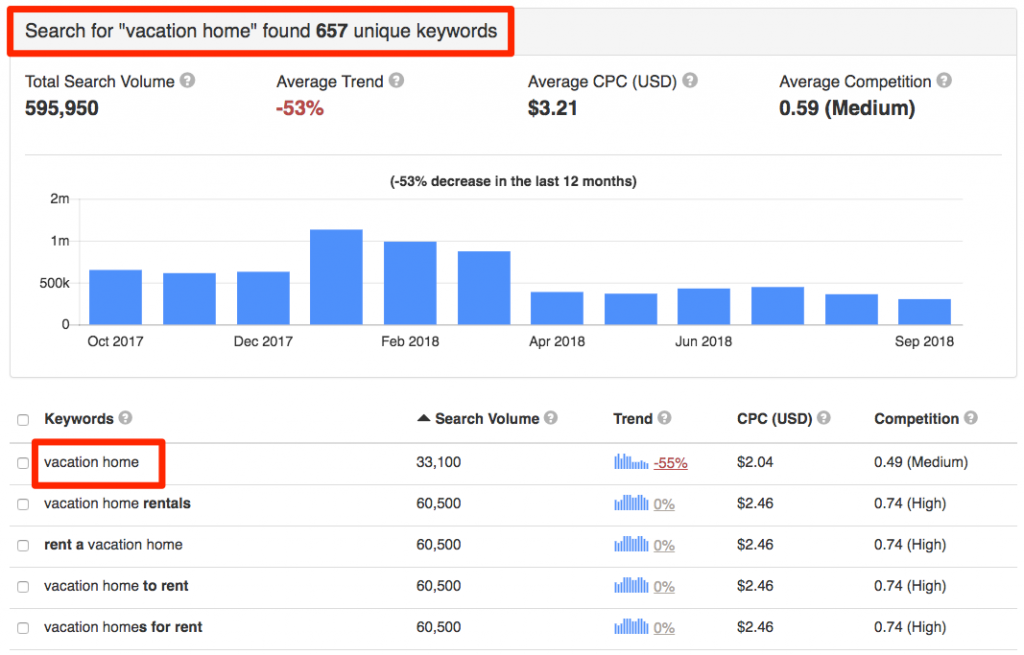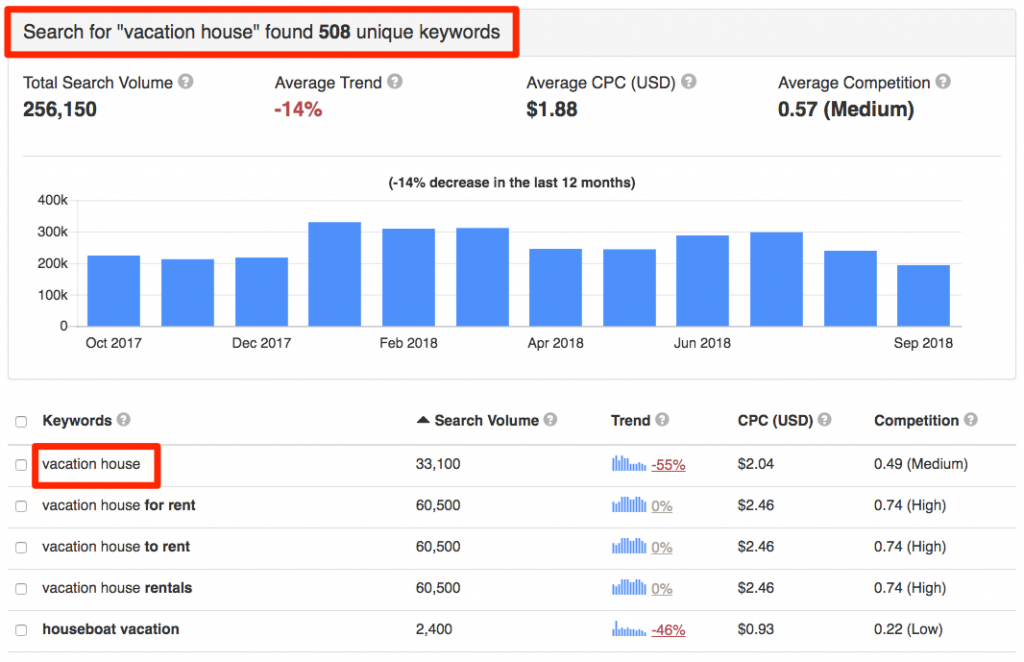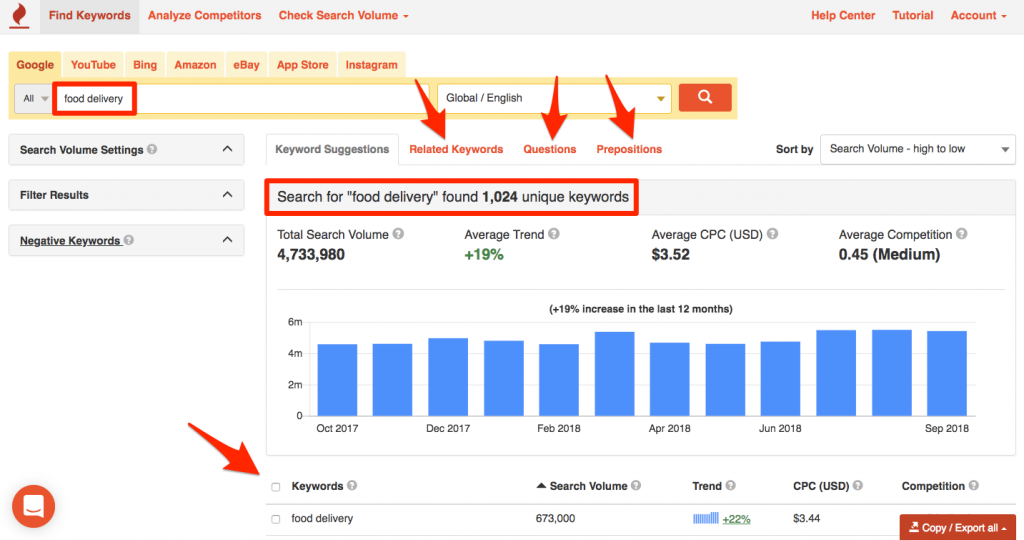Keyword research is a fundamental part of online marketing of all kinds and is especially relevant to freelance writers, online publishers, and bloggers. Search engines prefer attractive content, but if you don’t use the words that people are really interested in and actively search for, you will lose a lot of traffic.
What Are The Keywords?
Keywords (sometimes called “SEO keywords”) are words or phrases that a user types in the search engine to find certain information on the Internet. The keyword is a gateway that leads people to organic search results and ultimately to the website where they find what they are looking for.
This is why finding the right keywords is so important in search engine optimization. It helps you find the phrases people use when searching for information, so you can optimize your site so that the correct keywords appear in search results.
Keywords are discovered through a process called keyword research.
What Is Keyword Research?
Keyword research is an SEO practice to find, analyze, and use the phrases people use to search for information on the Internet.
In other words, it’s about knowing the language of your potential visitors and using that knowledge to optimize your content.
Why Is Keyword Research Important?
By using effective keyword research tools, you can determine a popular (profitable) niche, find related markets, rank well in search engines for specific topics to drive traffic to your site, and promote your products and/or services. , improving its marketing effectiveness.
Finding high volume search terms alone is not enough. You need to make sure that the SEO keywords used in your content match your brand, product or service with the keywords used by the customer. And this is where keyword research takes place.
After conducting a proper and thorough search, only then can you create a viable SEO strategy. With a good strategy, you can create a detailed action plan to achieve your goals.

For example, if you rent vacation homes, your content may contain the focus keyword “vacation home”. But, without proper keyword research, the keyword used could be “vacation house”.

While it’s still a technically correct term, there may be a mismatch with what your potential customers are searching for on Google.
The keywords you choose to use should be what your target audience is looking for. Only then will you make the effort to optimize your page for its worth.
However, the most important thing is that two similar keywords tend to have different volumes, trends, and levels of competition. Choosing a more relevant, higher-volume keyword could deliver better results compared to other semantic or related keywords.
Most Effective Ways To Do Keyword Research
There are several ways to do this, either manually or using a keyword research tool, such as the Keyword Tool. But regardless of which form you choose, there are several important steps you must take.
From outlining your goals to executing your keyword plan, follow these detailed instructions to conduct thorough and exhaustive keyword research:
1. Study Your Niche
Before you find out what the best keywords are to optimize your page, you better start digging deeper for more information on your topic or niche. It can provide ready-to-use ideas and help you discover angles in your SEO and marketing strategy that you have never thought of before.
Here are some ideas on how to study your niche:
- Talk to your existing customers and get to know them better. Discover the terms they use when describing your brand, company, product or service.
- Try to think from the perspective of your potential customers. If you share the brand’s offer with a friend, how are you going to talk about it?
- Participate in online communities of your topic or niche, such as forums and social networks. Read the discussions and discover the trouble spots mentioned regarding your niche.
2. Define Your Goals
A plan should always start by setting the end goal. But before that, you should ask important and introspective questions like:
- Who are you?
- What is your brand
- What makes you special?
- What is your website?
- What promises do you make on your website?
After effectively answering these questions, you will need to specify what your brand mission is. Do you want to increase the number of subscribers? Or do you have a sales target for a certain date?
Defining your goal is important as it will provide you with guidance for your SEO strategy and plan. The search terms you will eventually use should be aligned with your goals, ideally targeted through different content marketing funnels. Your goals will also inform the purpose of your SEO copywriting and content.
Write down your goals. Draw pictures. Document them. This will provide the necessary structure and direction for your high-level content and your online marketing strategy.
3. Make A List Of Relevant Topics
Depending on the main category of your brand and the objectives you want to achieve, divide them into smaller subject groups. Make a list of all the topics related to your brand that you want to rank on Google.
For example, if you are an FMCG brand specializing in men’s personal care products, some topics related to your brand could be:
- male face wash
- antiperspirant deodorant
- male pattern baldness
They must be important topics for your business and be related to the buyer personas. Do you think about what topics your audience will search for in Google? These theme stores can be divided into keywords related to those topics.
4. Create A List Of Seed Keywords
Now that you have divided your main category into different groups of subtopics, you can start creating a list of seed keywords. These keywords should be related to your various topics and, most importantly, they are terms that your target audience may be searching for on Google.
The initial keywords or focus keywords are important as they will become the basis of your keyword research. They define their niche and identify their competitors.
If you’re wondering how to find the initial or focus keywords for your brand or product, it’s actually a lot easier than you think. All you have to do is describe your offer in the simplest possible way and discuss how others can Google it.
5. Use Good Keyword Research Tools
Can you assume that “shouldn’t keyword research begin with using a keyword tool?” There is no right or wrong answer, to be honest. But there is an obvious advantage in searching for search terms from the perspective of your brand or business in the first place.
This saves you from getting stuck on keywords and helps you gain a broader perspective on your SEO content and strategy.
Once you’ve identified your goals, topics, and a list of starting keywords, it’s time to use your keyword research tools to further refine your search terms.
One option is to use the Google Keyword Planner. Unfortunately, Google only provides approximate search volumes. Instead, you can use a tool like the Keyword Tool. This will provide much more detail and help you find the right address for your search terms. In addition, it can also provide additional ideas on related keywords.
All you need to do is type the topic (or the starting keyword) in the search box and it will provide you with a list of alternative keywords, including ones containing prepositions and questions:

6. Study The Search Intent
Inserting high-volume keywords to increase a page’s ranking used to work quite easily. But it is not so simple nowadays. Today, Google’s machine learning search algorithms compare search terms with user queries to find out search intent.
Search intent is defined as the intention or reason why people search for a specific term. There are many determining factors behind people’s research habits, such as:
- Why are they searching?
- Are they investigating because they have a question and want an answer to that question?
- Are you looking for a specific website?
- Are you looking because you want to buy something?
Try to put yourself in the place of your target audience. Why would they investigate your topic? How will the terms be entered? Are you looking to buy something? Or are you looking for a service to solve a specific problem?
Once you have a good idea of the search intent behind readers or leads, you can use it to fine-tune your keyword research. Getting a list of high-volume keywords related to your brand or topic is great. But finding keywords that directly match your target audience’s search intent is even better.
7. Identify Long-tail Keywords
Seed keywords are generally shorter search terms that are closely related to the main topic or category of your brand. Long-tail keywords, on the other hand, are more descriptive and often related to smaller groups of your brand subtopics. Matching your target audience’s search intent with long-tail keywords is much easier compared to initial keywords.
For example, if your site has published content on golf equipment reviews, the use of long-tail keywords like “which is the best iron 9 golf club” will attract a more relevant audience compared to the keyword “golf club”. initial golf “.
Long-tail keywords tend to get fewer clicks, but because they focus on a specific topic or product, they generally get a higher conversion rate.
8. Learn About Your Competitors
It’s not enough to do keyword research on Google just about your brand. You should also be aware of what your competitors are doing. The better you understand the content landscape in your industry, the better it will be for your SEO.
Understanding the competitiveness of different keywords will also allow you to identify search terms that can be difficult to classify. But most importantly, you can find keyword opportunity gaps. These opportunities occur when you find keywords related to your brand or industry with a low to medium level of competition.
To find these keyword opportunities, you can do keyword research on your competitors.
After following these steps, you should have enough information to create good content and an SEO strategy. You would also have obtained proper SEO writing data for your content.
Whether you’re running a content-focused blog, a small business, or a brand marketer, you’ll need keyword research to get started with your content and marketing activities.
Doing keyword research can be tedious and time-consuming. But most of the time, it pays off handsomely in the long run.

4 Comments
October 14, 2019
Whether you are a fortune 500 firm or a current begin-up
SEO can provide your small business the much wanted online presence and
proper internet design will show you how to connect along with your
customers. It’s advisable that you perform an internet background test
to see if the SEO company that you are looking for is reputable, and has garnered constructive feedback.
While no one knows what goes on at Google, one thing is for positive:
they’re at all times looking to make changes that can improve search engine results.
Looking forward, 54 % anticipate the financial system to grow during the next year, up from 29 p.c. Remember – these listings can rank well and potential clients can have a look at your small business particulars here.
You could find me on Twitter and LinkedIn. These are links that a customer or person can click on different web sites and
get linked again to your pages.
February 4, 2020
[…] You can choose to gain authority or target long-tail keywords. […]
February 7, 2020
Full understand what you share
next is action
February 8, 2020
Thanks